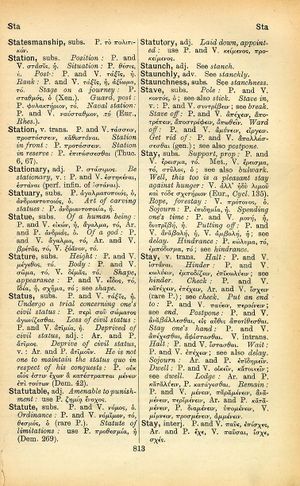station: Difference between revisions
From LSJ
ὁ γοῦν Ἀνάγυρός μοι κεκινῆσθαι δοκεῖ → did somebody fart, seems to me the Anagyros has been stirred up, I knew someone was raising a stink, the fat is in the fire
(CSV5) |
(nlel) |
||
| Line 23: | Line 23: | ||
<b class="b2">Station in reserve</b>: P. ἐπιτάσσεσθαι (Thuc. 6, 67). | <b class="b2">Station in reserve</b>: P. ἐπιτάσσεσθαι (Thuc. 6, 67). | ||
}} | |||
{{nlel | |||
|nleltext=[[σταθμός]] | |||
}} | }} | ||
Revision as of 17:45, 9 January 2019
English > Greek (Woodhouse)
subs.
Position: P. and V. στάσις, ἡ.
Situation: P. θέσις, ἡ.
Post.: P. and V. τάξις, ἡ.
Rank: P. and V. τάξις, ἡ, ἀξίωμα, τό.
Stage on a journey: P. σταθμός, ὁ (Xen.).
Guard, post: P. φυλακτήριον, τό.
Naval station: P. and V. ναύσταθμον, τό (Eur., Rhes.).
v. trans.
P. and V. τάσσειν, προστάσσειν, καθιστάναι.
Station in front: P. προτάσσειν.
Station in reserve: P. ἐπιτάσσεσθαι (Thuc. 6, 67).

